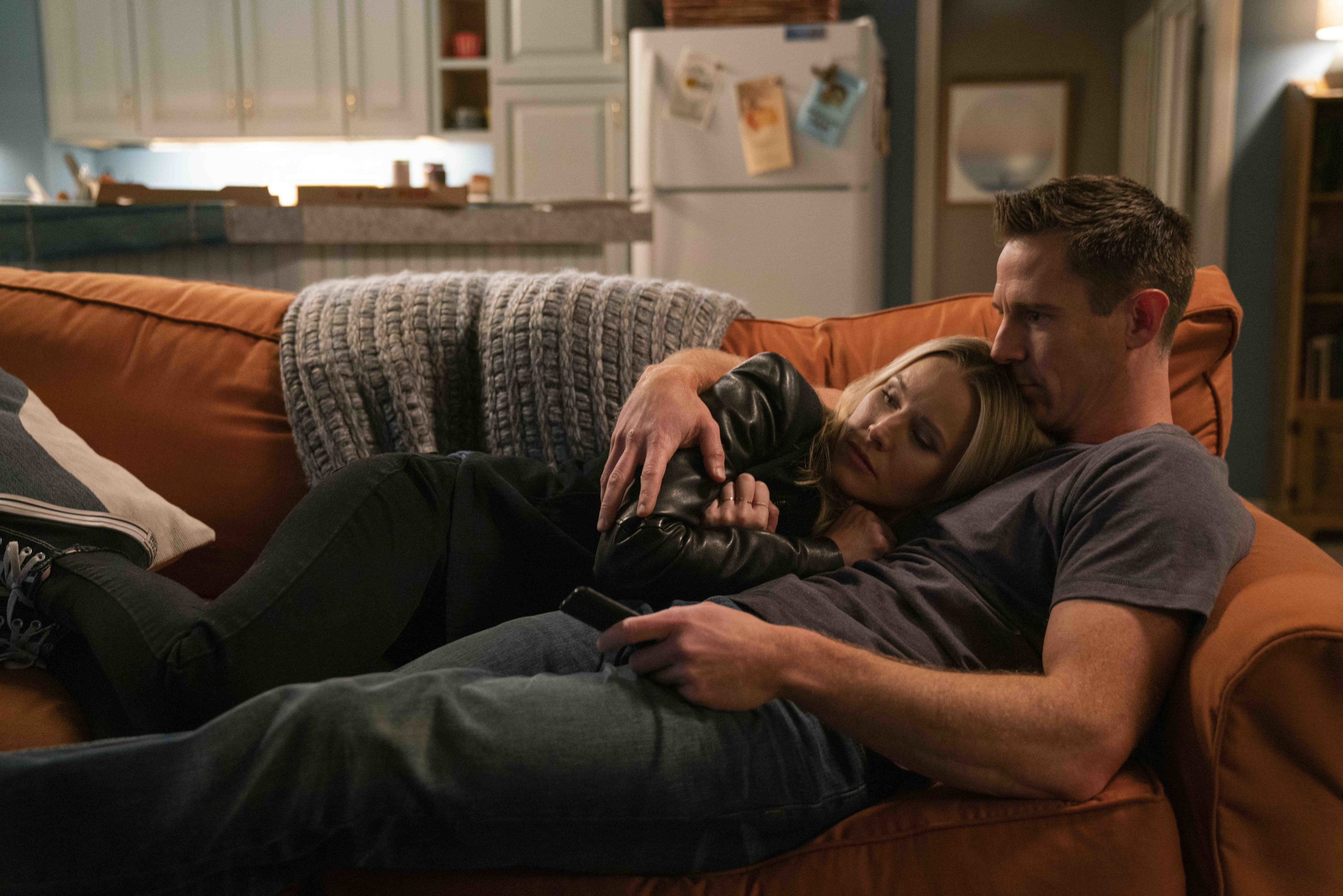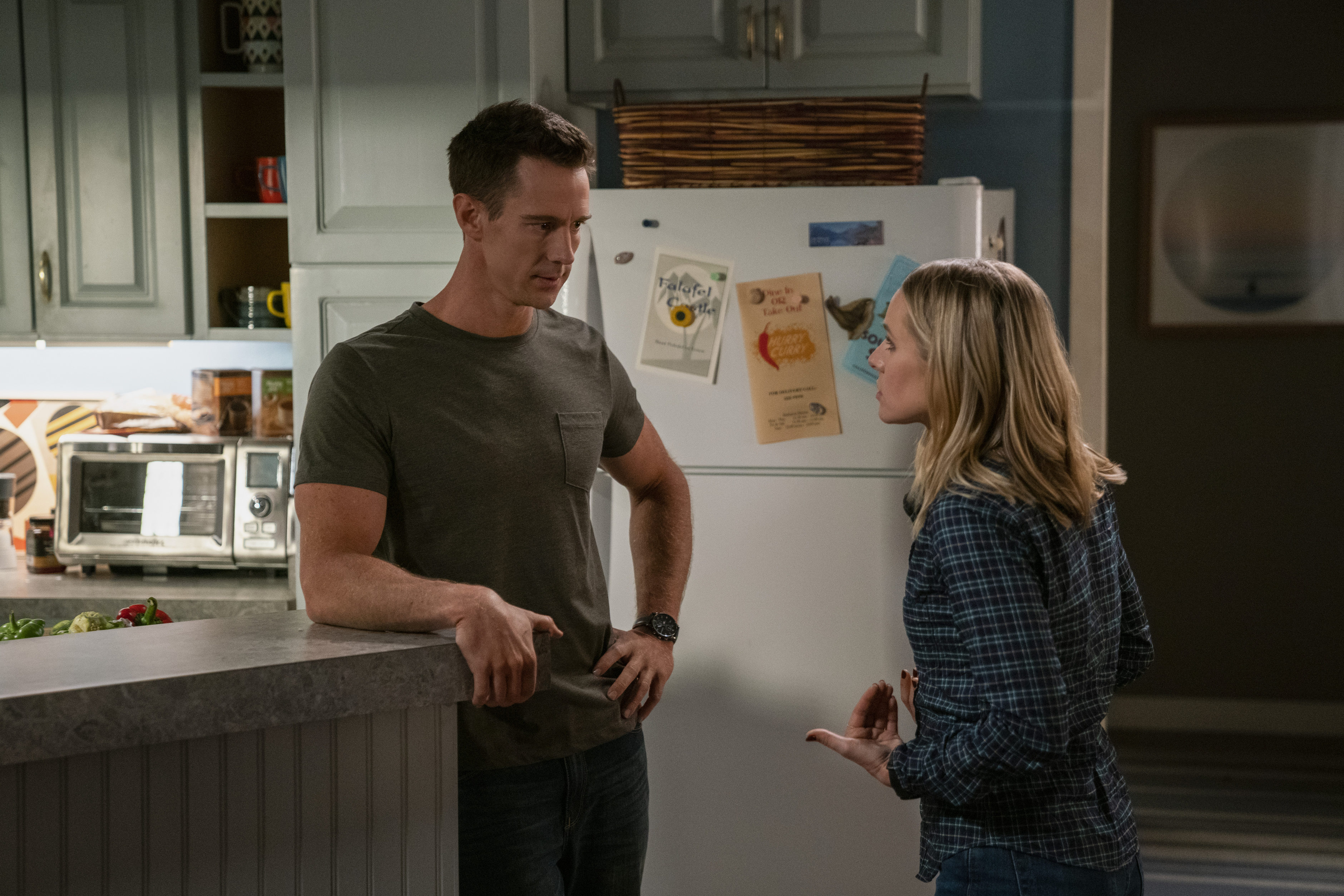When Hulu surprise-released the entire fourth season of Veronica Mars during the series panel at San Diego Comic-Con, a full week before its advertised release date, the fandom went haywire. The fact that the show has kept up such a huge following for 15 years after it initially premiered is an accomplishment in and of itself; the fact that a movie and a brand-new season were introduced years after the show was initially canceled is something else entirely.
The world was different in 2004, when showrunner Rob Thomas debuted a teen P.I. series starring Kristen Bell, but not that different. Still, in 2019, there are some concepts that feel outdated when it comes to telling stories about young women and the lives they lead — particularly how much trauma they must suffer in order to be considered Strong Female Protagonists.
We see versions of this trope all the time. A primary example: Joss Whedon famously put Buffy Summers through the wringer for seven seasons of television, including (spoilers for the show follow, obviously):
- Buffy sleeping with the man she loved, only for him to turn evil so that she had to kill him
- Buffy having her powers stripped from her by her father figure so she could “prove herself” in a fight against a physically powerful, mentally unstable vampire
- Buffy sacrificing herself to save the world
- Buffy being yanked from Heaven by her friends because they didn’t want to fight evil without her
- Buffy’s lover — who was previously obsessed with her to the point of creating a sex robot in her likeness — attempting to rape her
We also see it in Game of Thrones, with nearly all of the women on the series — but most especially Sansa Stark (Sophie Turner), who actually claimed in the season’s eighth and final season that being raped and brutalized by characters like Littlefinger (Aidan Gillen) and Ramsay Bolton (Iwan Rheon) is what made her strong. She told the Hound, “Without Littlefinger and Ramsay and the rest, I would’ve stayed a little bird all my life.”
This idea is incredibly toxic. It’s also one we see perpetuated across all genres and media types, especially when it comes to depictions of young women. Katniss Everdeen started a revolution to save her younger sister, only for Prim to be killed in that war; horror movies rely on “final girls” to appear feminist after two hours of violence and gore.
Veronica Mars, for all its genre trappings as a teen show that attempted to grow up, the same way its characters had, seems to be stuck in this age-old idea that the only way women can be strong is for them to experience trauma, over and over and over again, and still manage to get out of bed each morning.
That’s not to say this isn’t true of people in the real world; it is. Repeated trauma certainly happens, to people of all genders, especially if they come from a marginalized group. But the fact that Veronica can’t experience even a full day’s worth of contentment says a lot more about Thomas and his ideas of how storytelling works than about trauma and how it functions in the world.
And before anyone jumps on this in the comments, this also happens with male characters — especially in comics. Characters like Bruce Wayne lose people left and right, then struggle to maintain any semblance of humanity, only to lock up all of their trauma in order to be Strong. However, a common trope for male protagonists is the “Woman in the Refrigerator,” wherein losing a woman they love, usually in a romantic way, becomes a motivating factor for their entire character arc.
But even there, it’s the women who seem to get the short end of the stick, isn’t it? And when women’s love interests are murdered, their ability to move forward isn’t usually seen as a motivating factor for their arc; rather than radicalizing them, it just gets added to the laundry list of traumas they’ve experienced.
The rest of this essay contains specific spoilers for Veronica Mars season four, particularly the season finale, “Years, Continents, Bloodshed.”
In the first three seasons of Veronica Mars, when it aired on UPN and then the CW, Veronica’s best friend was murdered; her father lost his job; her alcoholic mother abandoned them, then returned, only to steal money and leave again; she was raped; she believed her father had been killed; she was drugged twice more and nearly raped again; she was filmed without permission having sex with her boyfriend and the tape was released publicly at her university.
While it’s true that the series deals with crime and Veronica works a dangerous job as a private investigator, including all of these elements in her story feels cheap. There’s a difference between learning to cope with trauma and having it piled on in order to seem Strong. The writers throw as much trauma at her as they can manage, yet still try to make it seem believable that she wouldn’t eventually see a therapist for PTSD or, possibly, go on medication.

In Veronica Mars season four, the issue of therapy comes up repeatedly. Logan (Jason Dohring) sees a therapist every week, sometimes more than once. Following a childhood of physical and emotional abuse, the murder of his first high school girlfriend at the hands of his dad, his mother’s suicide, and being framed for murder, among other traumas, followed by active military service in his adult years, Logan has a lot to unpack. He’s always been a character who is quick to anger and even quicker to reactionary dramatics and manipulation. However, in the new season, he’s more emotionally stable, though still making selfish decisions — like buying an engagement ring for Veronica, whose first line in the pilot episode was, “I’m never getting married.”
Clearly, boundaries are still an issue, even after all these years together. That pendulum swings both ways: Logan wants Veronica to want to marry him, and he wants kids, and he wants that fully settled, domestic life complete with rings and baby bibs. Veronica, on the other hand, wants the reactionary and violent Logan of the past — the Hulk, rather than Bruce Banner, as Logan quips in one of the most fascinating, yet least explored moments of the season.
Through the course of season four, the dynamic between Logan and Veronica is never explored as fully as it could be, save for one scene that is never revisited. However, Veronica repeatedly refuses to see a therapist, even at Logan’s urging. She won’t even consider couples therapy. (For the record, it would be wildly unethical for a therapist to agree to see a patient’s partner, or to see them as a couple, if said therapist has already been working with a person for some time. They would be going into any sessions with an established bias, which defeats the purpose of therapy completely.)

Then, she has an epiphany about wanting to be with Logan forever, and the two decide to elope. This decision, followed by the moments leading up to and following it, are euphoric for both characters. The wedding itself is lovely; it appears, for a moment, that Veronica will get to explore a happy ending with the man she loves, in spite of everything she’s been through. Of course, viewers should know better — any time Veronica has even a moment of happiness, it’s counter-balanced by something traumatic.
In this case, Logan dies. A bomb meant for Veronica claims his life instead, and Veronica puts the pieces together seconds before the explosion — there isn’t enough time to even shout Logan’s name, let alone save him. Then, rather than seeing the immediate aftermath of his death, the episode jumps ahead a full year as Veronica narrates how her life changes in that period of time.
The real kicker isn’t that she goes to see Logan’s therapist a year after his death (which would still be unethical, for the record). It’s that his therapist gives Veronica a voicemail recording that she has, for some reason, kept for 12 months — ostensibly in case Veronica decided to make an appointment, so that she could pile even more trauma on her.
In the voicemail, left by Logan the day of his and Veronica’s wedding, he says, “Is it weird to want to marry someone because you respect her? Because you want to be like her? Because you want children who will inherit her qualities? I want to marry Veronica because she’s the toughest human being I’ve ever met. Blows that would destroy most people — she always picks herself back up.”
Is it bold for Thomas to have a character outright state his apparent mission statement for categorizing Veronica as a Strong Female Protagonist? Not really. If anything, it just serves to solidify how out of touch he and other writers — including women like Suzanne Collins, the author of The Hunger Games — tend to be when it comes to writing these narratives.
Trauma happens. Sometimes, it happens repeatedly. For those of us who suffer blow after blow, getting out of bed in the morning is sometimes the most we can manage. Sometimes we’re triggered by little, unexpected things, like the smell of someone’s perfume on the subway or the sound of someone’s voice in the grocery store. Veronica, for all of her trauma, seems to compartmentalize to the point that she can move through each day without ever pausing to think about anything she’s been dealt. Not only is that unrealistic, it’s insulting. It’s insulting to her character and to those who identify with her.
And she’s not the only one. Too often, characters like Veronica and Buffy are heralded as Triumphs of Feminism because they’re badass and because they lead their lives with strength and resilience. But seeing these characters be repeatedly ripped to shreds, then forced to move forward without any real exploration of what that means or how it will look for them, does a disservice to the writing, the writers themselves and, as always, the audience.
Overcoming repeated trauma isn’t the only way to be strong. Stable relationships and contentment do not render stories or characters uninteresting or useless. Romance isn’t just for teenagers and growing up doesn’t have to happen through a series of horrifying experiences that change us forever. So Rob Thomas, if you’re reading this: do better. And to all the other storytellers who believe this trope has to be the focal point of their work: it doesn’t. It shouldn’t be.
It’s time to tell new stories.









Thank you, this is the most on-point analysis I’ve seen yet of why the decision to kill Logan was so harmful: how much trauma are we expected to endure and keep going/stay interesting? He so easily could have been a kind of home base for her, even a not-easy one, while she explores mysteries and works as a PI and still, still has the trauma of her background running through her and the storylines. This was, as you so eloquently put it, cheap and wrong.
The problem is that -for the writers anyway- trauma is far more exciting then exploring the aftermath. These shows thrive on excitement. With Buffy every new season searched for new ways to put her through the wringer, that made the show exciting even if it went in wild directions. I haven’t seen Veronica since the movie, but it seems to me that Logan getting killed was Veronica’s own refrigerator moment. I see this in a lot of comics and shows, to put it plainly if the hero or heroine isn’t miserable the writers don’t think they are interesting.
When I finished the last episode last night, I was shocked and disappointed. I was trying to understand why and I realised quickly reading Rob Thomas’s reasoning was to keep her the underdog and suffering was just plain lazy and disrespectful to him, the characters, and the show. My impression was he felt he couldn’t write anything good for someone who isn’t ‘suffering’, and that explorations about love feel ‘teenage’, and relationships are boring to write. It sends a bad message about needing to suffer to create good stories and art, that focusing on the challenges of an adult relationship seems too mundane, and that it is more interesting to run away from something (leave town in pain) than to chase something challenging and worthy (pursue important causes out of your town). There is so much more that could be explored by bring an adult and taking on changes and growth instead of blowing things up just to make a traumatic change happen. Thanks for sharing your thoughts on this, I’m glad other people are concerned about this as well and hope the writers take note of what would be the higher road and more mature and challenging thing to do for the show.
So many good points in this article, thank you!
Comments are closed.